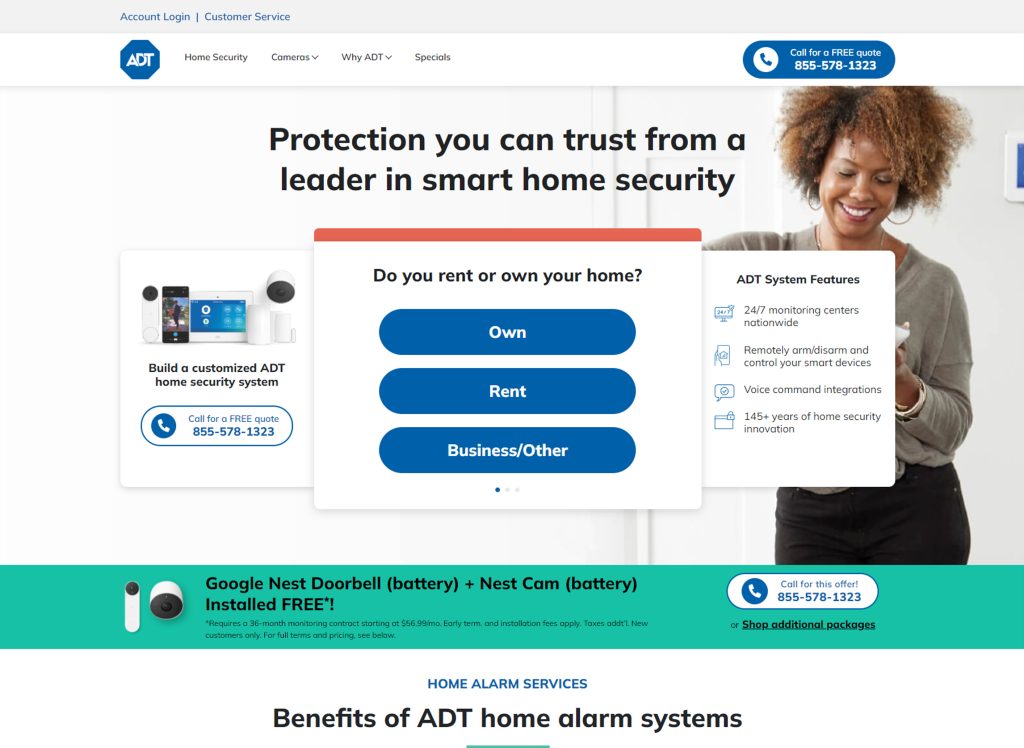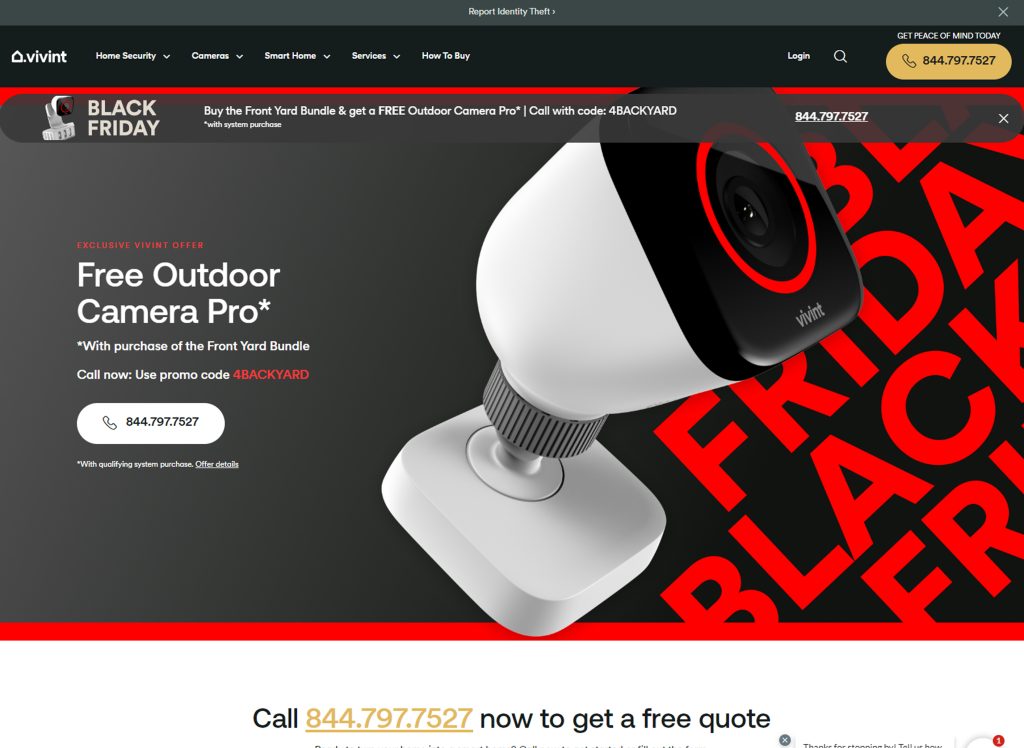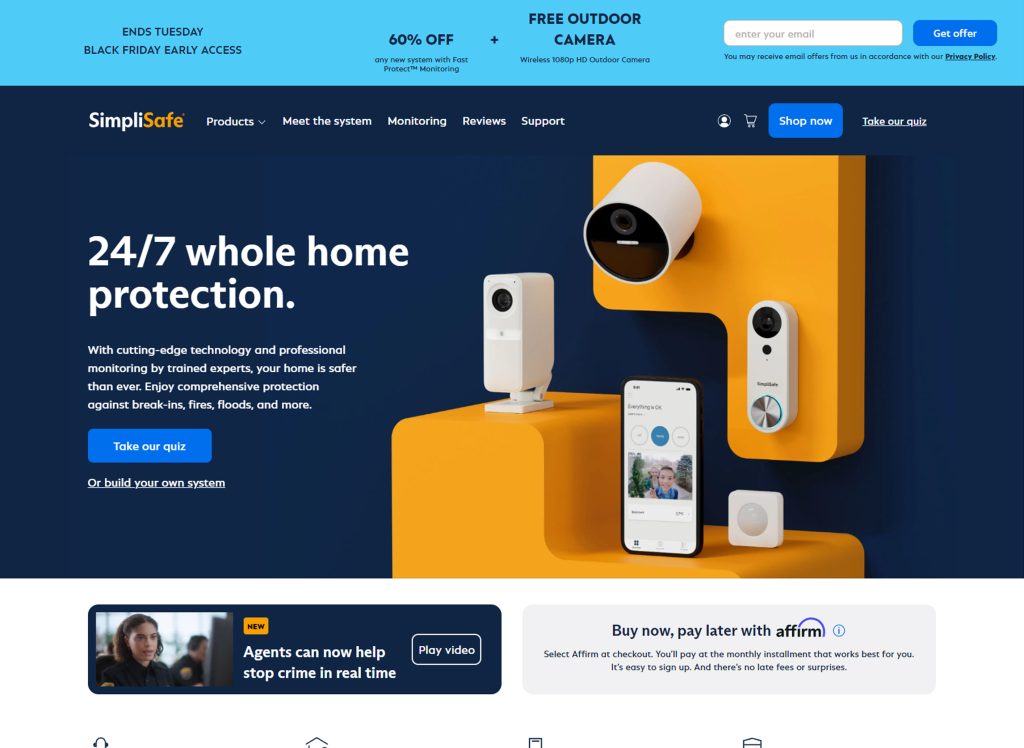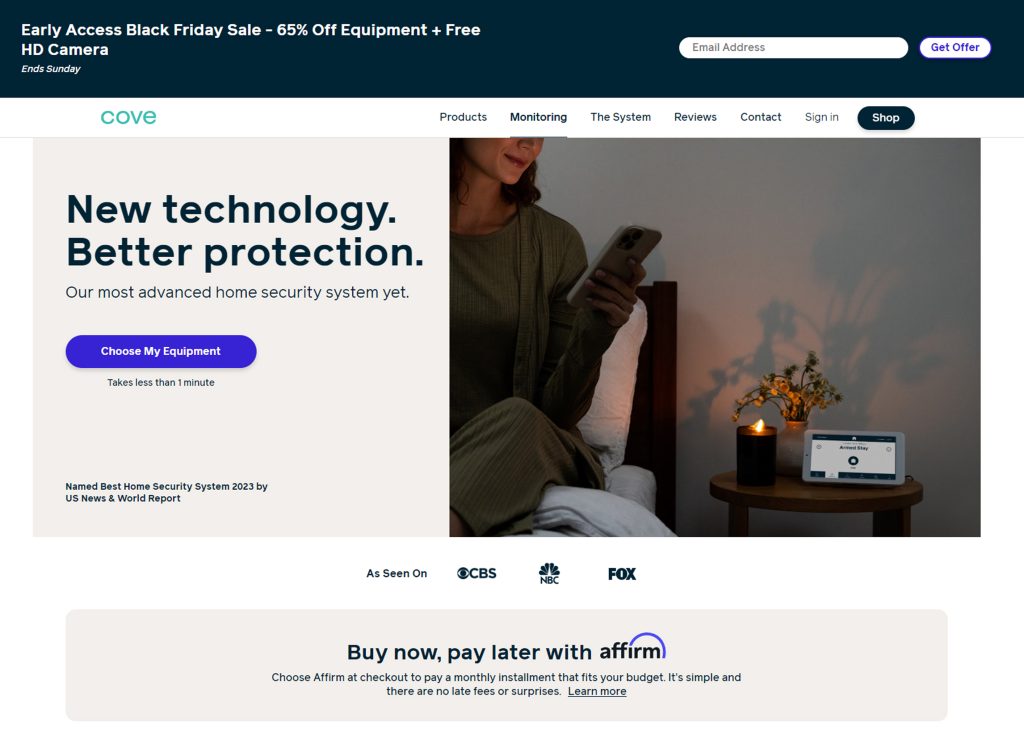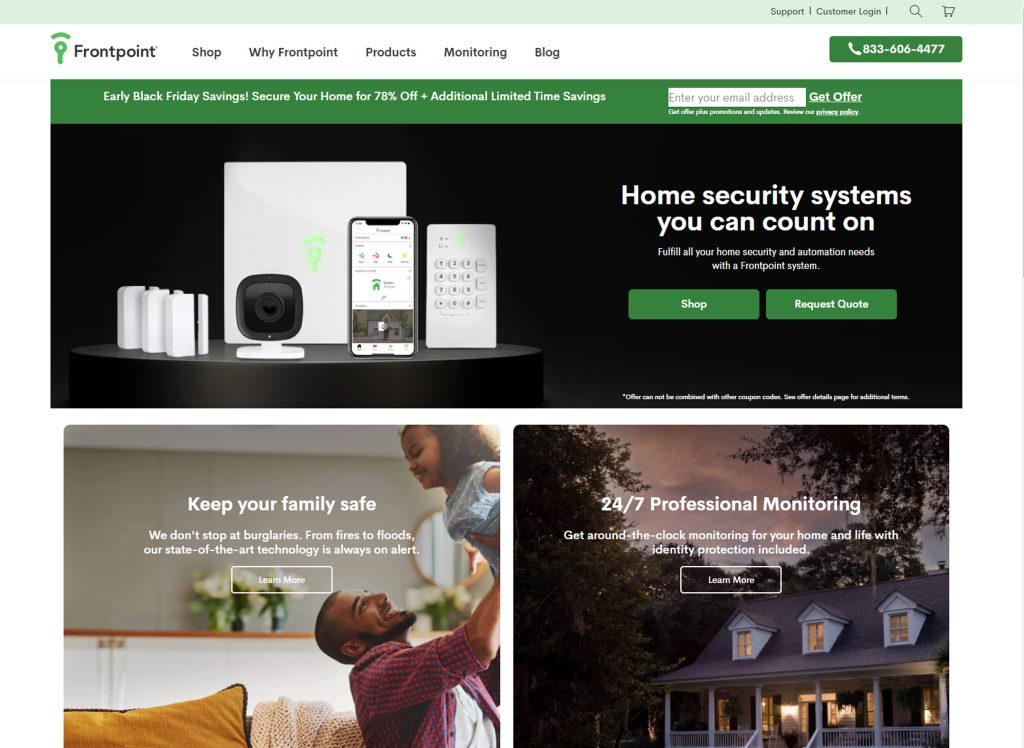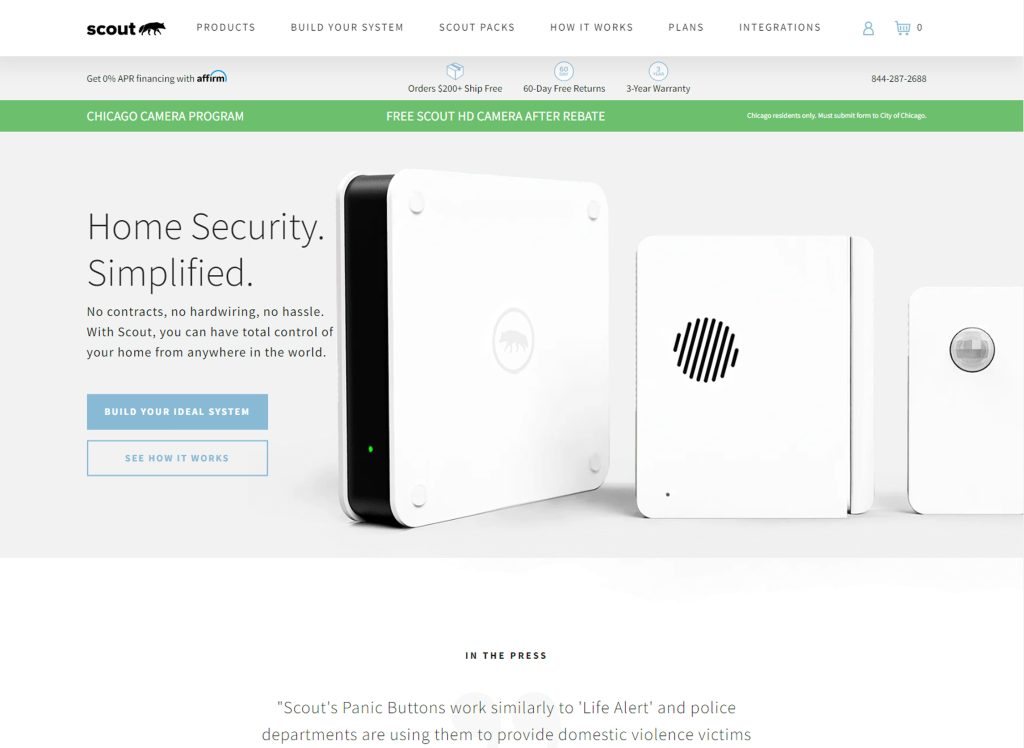The listings featured on this site are from companies from which this site receives compensation. This influences where, how and in what order such listings appear on this site. Advertiser Disclosure
These are some websites that we have carefully selected
Best Home Security Systems & Companies 2025 - Keep Your Home Safe.
According to the Federal Bureau of Investigation, the US was hit by over half a million burglaries in 2019, over 50% of which happened during daylight hours. Why should this statistic concern you? Because without taking proactive steps to secure your home and valuables, you may become a statistic too.
Years of experience
Helped users

ADT

Vivint

SimpliSafe

Cove

Frontpoint

Scout
The specific information is as follows:
01.
- Best for – Professional monitoring and reliable customer service
- Price – From $45.99/month
- Money-back guarantee – Six months limited
ADT is a reliable home security company with more than 140 years of industry experience. They offer a range of services, including 24/7 monitoring, professional installation, and a variety of equipment options such as cameras, door and window sensors, and smart home devices.
Andrew Sinden, Cybersecurity Expert at StarLinkHow, remarks that ADT is a “reputable firm with a long history of offering trustworthy and complete security solutions.” This sentiment is especially reflected in ADT’s many positive customer reviews and six-month money-back guarantee—the longest full refund window on our list.
Why we chose ADT: They use smart home integrations and provide comprehensive 24/7 protection. You can even monitor your home and control your security system from anywhere in the world with their mobile app.
Our experience: The installation was seamless and quick—the technician also helped us set up the mobile app and put up a yard sign saying the house had a security system installed.
Vivint is a highly rated company that provides a range of smart security kits. Their app gives you complete control of your home, letting you switch your lights on and off, monitor security cameras, and lock and unlock doors directly from your phone.
Raj, Chief Editor at WireQuality, calls Vivint “an innovative home technology provider” and remarks on their dedication to “ease of use, seamless connectivity, and enhancing safety and convenience for homeowners.”
Why we chose Vivint: Vivint’s professional installers evaluate your home before suggesting equipment, so you get personalized service from day one. They even provide energy management services to save you money on electric bills.
Our experience: We liked Vivint’s Smart Deter technology, which wards off potential burglars with sounds and lights as soon as security sensors detect them.
03.
- Best for – Quick, wireless installation
- Price – From $27.99/month
- Money-back guarantee – 60 days
SimpliSafe provides user-friendly, dependable, and customizable wireless security systems with 24/7 monitoring. You can choose the level of service you need for installation – professional or DIY, as well as the level of monitoring you’ll need.
Eric Lee, Co-Founder of real estate investment firm REI Insiders, mentions that “SimpliSafe is a great budget option, and it’s easy to install and use.” Most of their devices are also plug-and-play, such as video doorbells and smart locks.
Why we chose SimpliSafe: SimpliSafe’s wireless systems don’t require professional installation, although they offer this as an option. And, all their contracts are month-to-month, so you don’t have to commit to a yearly agreement like with other companies.
Our experience: It’s straightforward to set up the monitoring system and mount components with the attached sticky pads. Access to customer service was also convenient—we especially liked their live chat feature.
04.
- Best for – Beginners looking for easy installation and no contract
- Price – From $17.99/month
- Money-back guarantee – 60 days
Cove provides high-quality home security equipment, including video surveillance, smart sensors, and alarm systems. Their DIY installation process is beginner-friendly, and their user reviews are extremely encouraging.
To use Cove’s products, you must subscribe to one of two monthly professional monitoring plans: Cove Basic or Cove Plus. Cove Plus includes the use of security cameras, while Cove Basic doesn’t. Cove doesn’t require you to sign a contract, but make sure to keep up your monthly payments, or your devices will simply stop working.
Why we chose Cove: Your security system is supported by round-the-clock customer service and is mobile-compatible with both Android and iOS devices. All items also come with a 60-day money-back guarantee.
Our experience: Although Cove offers optional professional installation, we found it easy to set up the equipment ourselves. We liked that we could access the Cove emergency center 24/7 via the system—something we didn’t see in other DIY solutions.
05.
- Best for – Home security without a WiFi connection
- Price – $49.20/month
- Money-back guarantee – 30 days
Frontpoint Security provides customizable and DIY-friendly alarm systems. Their equipment is also fully cellular, making it ideal for unstable WiFi connections.
Their customer service is exceptional, with responsive representatives available from 8 a.m. to 11 p.m. on weekdays and 10 a.m. to 7 p.m. on weekends. Their customers also benefit from security paired with the convenience of smart technology—their devices are integrated with Google Assistant and Alexa.
Why we chose Frontpoint Security: They’re especially ideal for renters—their equipment is fully cellular and wireless, so you can easily remove and take it with you when you move. You can also add cameras, smart home devices, and safety alarms like smoke detectors to your plan.
Our experience: We liked that we could lower the investment costs by adding security equipment to the plan later on instead of buying everything all at once. Although they aren’t the cheapest option for monthly monitoring, we were happy with the quality of their devices.
06.
- Best for – Self-installation without fees
- Price – From $9.99/month
- Money-back guarantee – 60 days
Scout Alarm’s main offering is a modern, easy-to-use home security system that can be customized to fit the needs of individual homeowners.
The self-monitoring plan (Always On) costs $9.99/month, while the professional monitoring plan (Always On+) costs $19.99/month. Their top features include customizable email and phone notifications, and backup cellular connectivity and battery power.
Why we chose Scout Alarm: You can install the security features you want for your home without needing to pay installation fees. The advanced plan dispatches police and firefighters in case of emergency.
Our experience: The Scout Small Package only took us about 45 minutes to install. The process was as simple as connecting the Scout Hub to the WiFi router with an Ethernet cable, entering the installation code from the QuickStart card, and letting the Hub pair with each device.
Frequently Asked Questions
What is the best home security system?
ADT (the parent company of systems like ADT Self Setup) offers the best professional and DIY monitoring and has a reputation for reliable customer service. Ultimately, the best home security system depends on your budget, as well as monitoring and equipment needs.
What is the easiest home security system to install?
Cove's wireless systems don't require complicated wall drilling or mounting. You can easily mount the door sensors and motion detectors with the peel-and-stick adhesive.
Is it worth getting a security system?
Yes, it's definitely worth getting a home security system to protect yourself and your possessions. They deter burglars, alert you when intruders are on your premises, and serve as evidence in the event of a break-in.
Who has the best price on home security systems?
At $9.99 a month, Scout Alarm's monitoring cost is significantly lower than the industry average of around $30.
What is the best home security system without a monthly fee?
SimpliSafe is the best home security system without a monthly fee, although this only applies if you don’t use their video cameras. If you want cameras included, then pricing starts at 33¢ per day.
What's the difference between ADT and SimpliSafe?
ADT is a more comprehensive security system with professional installation and a wide range of equipment options. SimpliSafe, on the other hand, is a more affordable system that you can set up yourself.
Who Should Consider Getting a Home Security System?
*Nest Doorbell Professionally Installed Free: Requires 36-month monitoring contract starting at $56.99/mo. with QSP (24-month monitoring contract in California, total fees from $1,367.76), and enrollment in ADT EasyPay. Offer includes installation of one (1) Nest Doorbell with minimum purchase price of $599 after promotion is applied depending on geographic location. Maximum discount $229. Nest Doorbell includes wired or battery options. Offer available for new ADT customers only. Limit one per customer, not combinable with other offers. Upon early termination by Customer, ADT may charge 75% of the monthly service charges due for the balance of the initial contract term. Quality Service Plan (QSP) is ADT’s Extended Limited Warranty. Service and installation charges vary depending on system configuration, equipment and services selected. Google and Nest Doorbell are trademarks of Google LLC. Some features, including mobile notifications, remote control, video streaming, and video recording, require working internet and Wi-Fi. Minimum OS requirements are available at g.co/home/req. iOS is a trademark of Cisco and is used under license. Expires 11/30/23.**$100 ADT Visa Reward Card: Requires 36-month monitoring contract starting at $28.99/mo. (24-month monitoring contract in California, total fees from 695.76), and enrollment in ADT EasyPay. Requires minimum purchase price of $449. One (1) Visa Reward Card valued at $100 is redeemable seven (7) days after system is installed, wherein an email is sent to the customer’s email address associated with their account with a promo code. The customer must validate the promo code on the website provided in the email and a physical card will be sent in the mail. Installation must occur within 60 days of offer expiration date to receive card. Applicable to new and resale sale types only. Card is issued by Pathward, N.A., Member FDIC, pursuant to a license from Visa U.S.A. Inc. No cash access or recurring payments. Can be used everywhere Visa debit cards are accepted. Card valid for up to 6 months; unused funds will forfeit after the valid thru date. Card terms and conditions apply. Expires 11/30/23.
Home security systems are an essential investment to protect your home and family. They come with various sensors and technologies that help safeguard what’s most valuable to you, both inside and outside your home.
If you have people working in your home, such as cleaners or handyworkers, indoor cameras also let you verify that they have completed their work, and didn’t damage or steal anything. Additionally, you can identify people who intend to steal your packages with a home security camera and sensor. You may even prevent them from doing so with an alert that sounds when someone comes near the front gate or porch.
How Do Home Security Systems Work?
What Are Common Components of a Security System?
Home security systems work using a combination of sensors, cameras, and alarms to detect and respond to potential intruders. Common components include the following:
Control Panel
The central control panel communicates with various sensors and cameras throughout your home. You can use it to arm and disarm the system, and depending on what type you have, you may also be able to monitor your home in real time via a mobile app or web portal.
Video Surveillance
Video surveillance, also known as closed-circuit television (CCTV), uses cameras to monitor specific areas. The cameras record video footage, which you can also view in real-time. Video surveillance significantly reduces crime in residential areas, and can help identify potential suspects in the event of a crime.
Burglar Alarms
When a sensor is triggered, a siren goes off, alerting you and the neighborhood of a potential intrusion. Burglar alarms can be installed as a standalone system or included in a more comprehensive home security package.
Motion Sensors
When a sensor detects motion or another type of spatial disturbance, it sends a signal to the control panel, triggering an alarm and/or sending an alert to your connected smartphone.
Contact Sensors
A contact sensor, also known as a door/window sensor or a magnetic sensor, detects when a door, window, or other entry point opens or closes. A magnet is attached to the door or window and an entry sensor is placed on the frame. When someone opens the door or window, the magnet moves away from the sensor, causing it to trigger the alarm.
Glass-Break Sensors
These are sound detectors that pick up when a window or glass door breaks, which could indicate a potential intruder. They can be wired or wireless. Some models come with adjustable sensitivity levels or the ability to differentiate between the sound of breaking glass and other loud noises.
Yard Signs and Stickers
When burglars know that your house has a security system in place, they are far less likely to break in and will move on to a different target. Most companies provide yard signs and stickers that indicate your house is surveilled and protected by security. The stickers are often placed on various doors and windows around the home, while the yard sign is placed out front.
Environmental Sensors
Environmental sensors monitor different conditions in a home or building. Common types of environmental sensors check for:
- The presence of fire and smoke
- Dangerous levels of carbon monoxide
- Extreme temperature fluctuations
- Humidity levels
- Water leaks
- Air quality
Choosing the Right Home Security System
The following are steps you should take when choosing a home security system:
1. Assess Your Security Requirements
Evaluate your home or property and look for where a burglar might try to enter your home. You should also check for areas that need extra protection, such as your front and back doors, garage, backyard, and windows.
2. Determine Your Budget
Weigh up how much you’re willing to spend on the system against the value of your assets. Then, decide whether you prefer a larger upfront cost with lower monthly fees, or vice versa.
3. Conduct Thorough Research
Before choosing a home security system, do your research and compare different companies in terms of available devices, security features, and past service reliability based on user reviews.
4. Decide Between Professional or DIY Installation and Monitoring
Consider whether you have the willingness and technical expertise to install and/or monitor a DIY home security system. If not, opt for a company or package that includes professional installation and 24/7 monitoring.
5. Consult With a Professional
If you’re hiring a professional installation company, you’ll likely meet with a representative to review your needs and get a quote. Many DIY companies also have customer service representatives available if you need similar assistance.
How Much Does a Reliable Security System Cost?
On average, upfront home security system costs can be as little as $200 for self-installed equipment to over $1,000 for a professionally installed and monitored system. Monitoring costs usually range between $20 and $50, depending on whether the system is professionally or self-monitored.
Indoor camera systems cost around $100 each, whereas outdoor cameras are about $200. Sensors for doors and windows are usually $30 each, and environmental sensors for smoke and carbon monoxide are priced at about $100 on average.
Systems with only basic sensor types are typically cheaper than those with smart home integrations and more advanced devices (like the best home security cameras and video doorbells).
Exploring Different Types of Home Security Systems
There are several types of home security systems. Some of the most common are:
Wired Systems
These are hardwired into your home’s electrical system and typically require professional installation. They’re more reliable than wireless systems but are often more expensive and difficult to install.
Wireless Systems
These systems use wireless technology (WiFi or cellular) to communicate with the different security components. They’re easier to install than wired systems and usually less expensive but are less reliable in areas with poor signal strength.
Monitored Systems
These systems are often professionally installed home security kits and are connected to an external monitoring center. They offer greater peace of mind but are more expensive than unmonitored systems.
Unmonitored Systems
Unmonitored systems are more affordable than monitored ones but are less reliable—they require you to manually respond to alerts and alarms.
DIY Home Security Systems: A Practical Option
DIY systems like SimpliSafe and Cove are ideal if you only have basic security needs. They’re usually the best home security systems for renters since they’re designed to be easily installed and removed if necessary. You also save on the cost of a home security system by installing and monitoring it yourself, which is perfect if you have a tight budget.
However, DIY products may not offer the same level of security or reliability as professional ones. You need to ensure they’re correctly installed and that all sensors and cameras are functioning properly. You also need to monitor the system yourself and respond to any alerts or alarms. This can be time-consuming and may not be feasible if you have a busy schedule or limited technical knowledge.
Professional Home Security Systems: Enhanced Protection
Professional systems like those from Brinks Home Security and Vector Security are the best home security systems for homeowners—they cater to those with unique or long-term security needs and/or highly valuable items. They also provide 24/7 monitoring and respond to alerts of an intrusion or other security breach.
These systems are installed and maintained by trained professionals who have years of experience and will ensure your home is protected in the best way possible. These experts also provide advice on the best system configuration for you and confirm everything is set up correctly.
Useful Tips for Home Security Systems
You can ensure that your home security system provides the level of protection you need by following these tips:
- Choose the right package: Home security systems come in many different configurations, so choose one that meets your specific needs. Consider factors such as the size of your home, the level of security you require, and your budget.
- Install the system correctly: To ensure your home security system functions properly, correct installation is key. If you don’t want to install a home security system yourself or feel comfortable doing so, consider hiring a professional.
- Test your devices: Whether you choose a monitored or unmonitored system, test your security system regularly to ensure that all devices are in working order. This will help you identify any issues before they become a problem.
- Monitor the system regularly: If you have a self-monitored system, you should monitor your surveillance footage often and quickly respond to alerts or alarms. This will also help you see if someone is casing your house for a future burglary.
- Implement additional security measures: Consider installing deadbolts on all exterior doors, using motion-sensor lights, and trimming back any shrubs or trees that could provide cover for burglars.
Additional Home Security Systems We’ve Reviewed
In addition to the providers reviewed above, we also reviewed the following companies using the same methodology:
- Guardian Protection – Best mobile app with custom automations
- CenturyLink – Best for packaged security with home communications
- Protect America – Best DIY system without upfront costs

